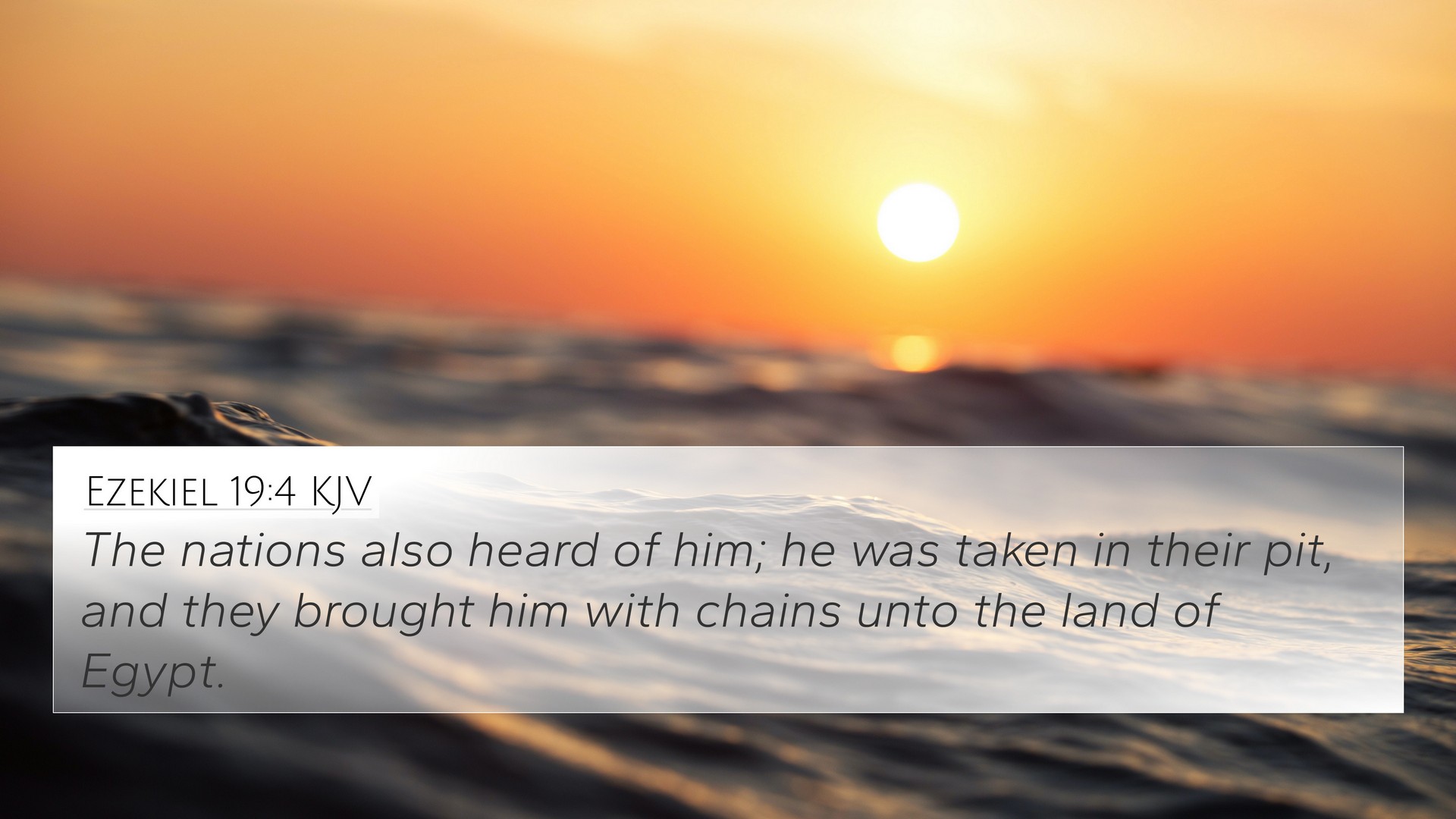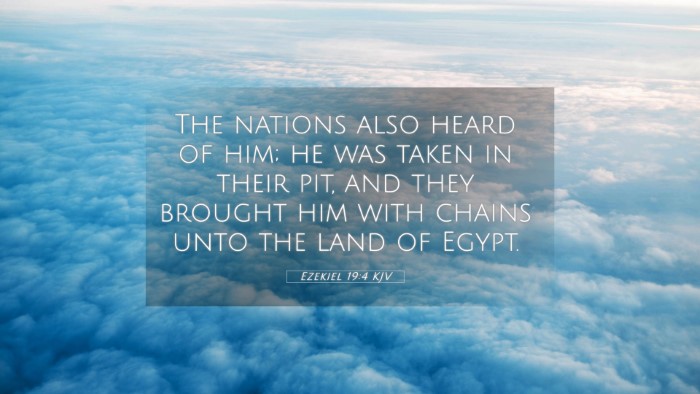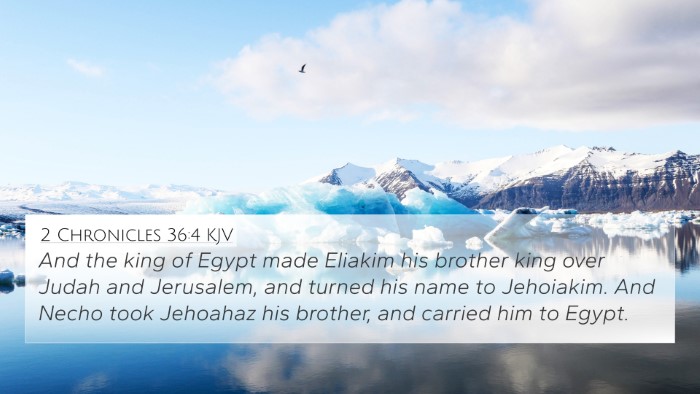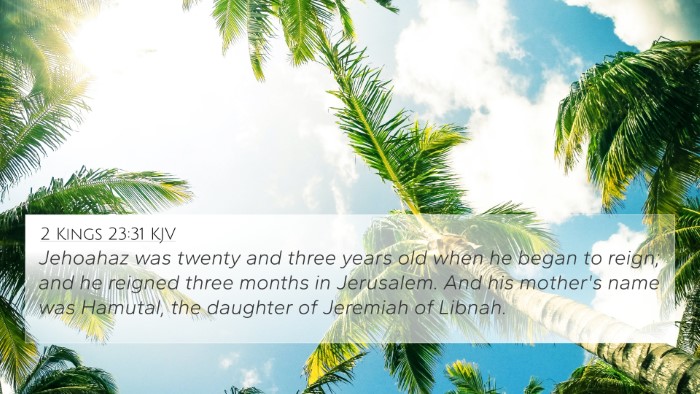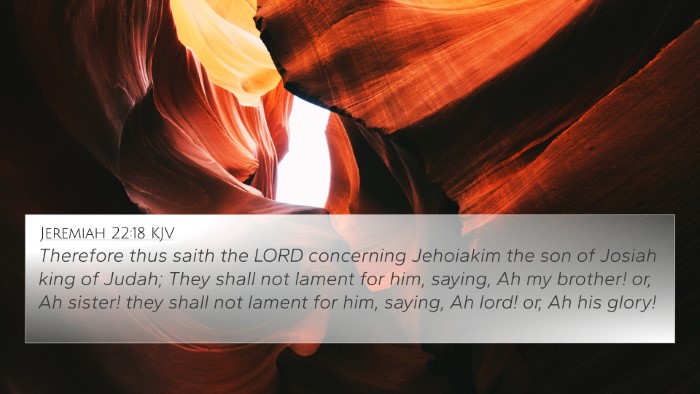Ezekiel 19:4 - Meaning and Interpretation
Verse: "The nations also heard of him; he was taken in their pit, and they brought him with chains unto the land of Egypt."
Summary and Analysis
Ezekiel 19:4 describes the fate of a great leader, often interpreted as a metaphor for the downfall of the nation of Israel. The verse paints a vivid picture of a once-mighty figure whose power is diminished, drawing the attention of surrounding nations. This moment of decline is significant in the broader context of Israel's history as portrayed in the prophetic literature.
Key Themes
- Decline of Leadership: The imagery indicates a loss of power and authority, a recurring theme in prophetic texts.
- National Identity: The reference to Egypt signifies a return to bondage and a loss of freedom.
- Interconnectedness of Nations: The involvement of other nations in the fate of Israel illustrates the global implications of Israel's choices.
Commentary Insights
Combining insights from Matthew Henry, Albert Barnes, and Adam Clarke, we find a multifaceted interpretation of Ezekiel 19:4:
Matthew Henry: He emphasizes the tragic fast that a once great leader is now captive, reflecting the humiliation of Israel. The “pit” symbolizes spiritual and physical ruin, highlighting the consequences of turning away from God.
Albert Barnes: Barnes connects the leader's downfall to the historical moments of Israel’s captivity and the role of external nations. The chains signify not just physical bondage but also a spiritual state of being ensnared by sin.
Adam Clarke: Clarke focuses on the judgment aspect, indicating that the leader's fall was a divine response to Israel's transgressions. The mention of Egypt is a stark reminder of Israel’s past captivity and the cyclical nature of their disobedience.
Connections to Other Bible Verses
Understanding Ezekiel 19:4 can be enriched by cross-referencing several key verses:
- 2 Kings 24:14-16: Details the exile of Judah and captures the essence of being taken captive.
- Jeremiah 52:28-30: Presents the outcome of the exiles and enhances the context of captivity.
- Psalm 137:1: Expresses the sorrow of Israel during their exile, resonating with the themes in Ezekiel.
- Isaiah 11:1: Offers a contrasting prophetic image of restoration that can be linked to Israel's fate.
- Lamentations 2:1: Echoes the themes of loss and the consequences of sin, providing a deeper emotional context.
- Ezekiel 17:7-9: Contains a parable that parallels the nation’s fate with that of a tree, mirroring the themes of downfall and captivity.
- Matthew 23:37: Highlights the collective failure to recognize divine warnings, leading to destruction, akin to what is depicted in Ezekiel.
Further Reflections on Cross-Referencing in Biblical Texts
The connections between Bible verses not only serve to illustrate the themes present within a single passage but also create a rich tapestry of inter-Biblical dialogue. Here are some insights into the importance of cross-referencing:
Thematic Connections
- Bible verse parallels: Identifying similarities between Ezekiel 19:4 and the exile narratives across the prophetic books.
- Scriptural cross-referencing: Tools like a Bible concordance can facilitate deeper study and understanding of these themes.
- Cross-reference Bible study: Engaging with a Bible cross-reference guide can help learners discover how various passages enrich one another.
- Identifying connections between Old and New Testament: It becomes clear when observing how the themes of captivity and redemption recur across scripture.
Practical Tools for Bible Study
Readers can benefit from employing various resources when studying Scripture, such as:
- Comprehensive Bible cross-reference materials
- Bible reference resources for thematic connections
- Cross-referencing Bible study methods that encourage deeper engagement with the texts.
Conclusion
Ezekiel 19:4 offers a poignant reflection on the themes of loss, captivity, and the repercussions of sin within the narrative of Israel. Through careful analysis and thoughtful cross-referencing with related scriptures, readers can appreciate the profound messages woven throughout the Bible. This verse, in conjunction with the insights from renowned commentaries, reveals the necessity of understanding Scripture's interconnected nature, further enriching one's spiritual journey.
